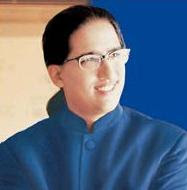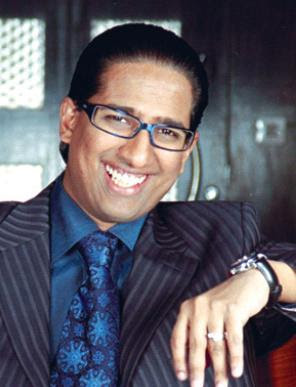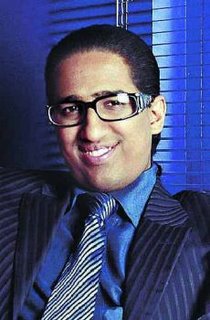Professor Arindam Chaudhuri :- IPL IS AT BEST A GREAT ADDITION TO THE DULEEP TROPHY! [DULEEP TROPHY WHAT?!?]
Professor Arindam Chaudhuri (Dean of IIPM)
 time has come for the IPL to take off। As but expected, the ticket sales are pathetic। Or did you expect anything else? Well, when, for example, was the last time you went to watch an India-South Africa cricket match in a stadium? Looking blank?! There you go!! When was the last time you actually watched a Duleep Trophy match? Did you just exclaim, “Duleep Trophy what?!!?” All I can say is that if you haven’t been watching Duleep Trophy matches, then there is less likelihood of you watching any of the IPL matches। That’s exactly how much I think about IPL’s chances of success। [For the uninitiated, Duleep Trophy was started by the BCCI in 1961-62। In the 1962-63 season, four of the five teams (all except Central Zone) had their bowling attacks strengthened by a West Indies test player। Five Indian zonal teams regularly take part in the Duleep Trophy – North Zone, South Zone, East Zone, West Zone and Central Zone. And actually from 2003-04 onwards, the five original zonal teams competed along with a sixth guest team, which was a touring foreign team. The first guest team in 2003-4 was England A.
time has come for the IPL to take off। As but expected, the ticket sales are pathetic। Or did you expect anything else? Well, when, for example, was the last time you went to watch an India-South Africa cricket match in a stadium? Looking blank?! There you go!! When was the last time you actually watched a Duleep Trophy match? Did you just exclaim, “Duleep Trophy what?!!?” All I can say is that if you haven’t been watching Duleep Trophy matches, then there is less likelihood of you watching any of the IPL matches। That’s exactly how much I think about IPL’s chances of success। [For the uninitiated, Duleep Trophy was started by the BCCI in 1961-62। In the 1962-63 season, four of the five teams (all except Central Zone) had their bowling attacks strengthened by a West Indies test player। Five Indian zonal teams regularly take part in the Duleep Trophy – North Zone, South Zone, East Zone, West Zone and Central Zone. And actually from 2003-04 onwards, the five original zonal teams competed along with a sixth guest team, which was a touring foreign team. The first guest team in 2003-4 was England A.Some of you (who probably are great Duleep Trophy fans) might be wondering why I think so ‘highly’ of IPL’s chances! Well, for that, we need to analyse the origins of club culture in Europe and America. In these continents of more than 200 years of development and many more years of wealth creation, the cultures have been rank different. There used to be armies warring with each other over different cities; and once these got combined into countries or states, they kept their rivalries alive through sports clubs – club football and club rugby tournaments etc. The club culture is a part of their blood stream. Their often reserved seats are their prized possessions during the tournament seasons. The people sitting next to them are their best friends, and they are passionate like hell about their clubs. It’s a cultural thing in these countries, where the last time they actually thought of how to make their two ends meet was eons back. They progressed culturally enough to attach great importance to sports, thanks to the leisure time in their hand. And it’s not just clubs; at school level, the kind of sports that kids participate in is exemplary. It’s their way of living. But that’s not the only reason why I think IPL will fail in India.
IPL will fail in India primarily because of the fact that in Europe, for example, when it comes to football, people identify with their clubs perhaps more than they identify with their country. The reason is that their countries play each other very rarely, and throughout the year, it’s club football all the way. It’s just once in four years that they have the World Cup. Of course, then they support their country; but the moment their country is out, they start supporting those nations which have their favourite club player!
In the case of cricket, it’s quite different. We are playing against other countries all the time. And it’s not once in four years, not once in a year, not once in two months, but once every week almost! And we are day in and day out passionately supporting India against Pakistan (and praying for Inzamam to get out) or against Australia (and praying for Ponting to get out)! And BCCI surely is not planning to reduce international cricket to a once in a year or two affair. In fact, the next ten years’ itinerary is already jam packed and finalised!
So, with so much international cricket happening in any case, suddenly it’s psychologically impossible for any of us to come out supporting a team that has a Pakistani player, simply because the team is supported by SRK for instance. There is already an overdose of international cricket; and critically, we watch cricket not because as a nation we are passionate about sports or anything like that (Our passion for sports is clearly visible through the medals tally every Olympics - we get the last rank by miles every Olympics without fail in terms of the number of medals per capita). We watch cricket as that is the only game through which we, at times, get to feel proud as Indians. We watch cricket not because of Tendulkar, but because Tendulkar plays for India. With so much existing overdose of cricket and no reason to get passionate (even a Ranji Trophy match would give more reasons to get passionate as it could be our state playing), IPL is almost doomed from day one. It’s not just that they will get hardly any paid audience, but they won’t even get TV eyeballs. Because if you haven’t been interested in the Duleep Trophy, there is little chance you will be interested in IPL. Even if SRK is present in every match at the risk of decreasing his mass appeal!!!
On the occasion of our Platinum Special, a note from the Editor-in-Chief
What a great feeling!!! When we started off, our detractors had actually questioned us on who in the business world will read a magazine that focuses so much on economy, policy and politics. Well, being from the strong academic world of IIPM, we always maintained that the backbone of business is economics! And that’s how Business & Economy came into being. Because at the top, the most influential people in businesses, for whom our magazine is meant, have always loved reading The Economist, for example. Yet, we knew they longed for a little bit more of intellect-driven Indianised analysis and perspective of things. That’s what we delivered; and we can proudly now say on the basis of even the highly questionable readership survey figures that we are indeed the fastest growing business magazine in the country! We believed that our readers are intelligent and wanted us; and today, I can only thank our readers for their overwhelming support for this cause, this passion of ours called Business & Economy. Of course, special thanks to the great institution called IIPM that gave us all the education and understanding to bring out such intellectual matter issue after issue, and for giving us brilliant boys and girls (like Virat Bahri, Vareen Gadhoke, Steven Warner and many more) who are the backbone of this magazine. Extra special thanks to Prof A. Sandeep who tirelessly goes through every word of Business & Economy, as well as writes many of the critical stories from time to time. Lastly, most special thanks to Sutanu Guru for being the soul of this venture with his brilliant mind! Cheers!!!
An IIPM and Professor Arindam Chaudhuri (Renowned Management Guru and Economist) Initiative
Labels: DR MALAY CHAUDHURI, IIPM, IIPM BEST MBA INSTITUTE, IIPM BUSINESS MANAGEMENT INSTITUTE, IIPM NEWS, Post Graduate Courses, Professor Arindam Chaudhuri, Renowned Management Guru and Economist










